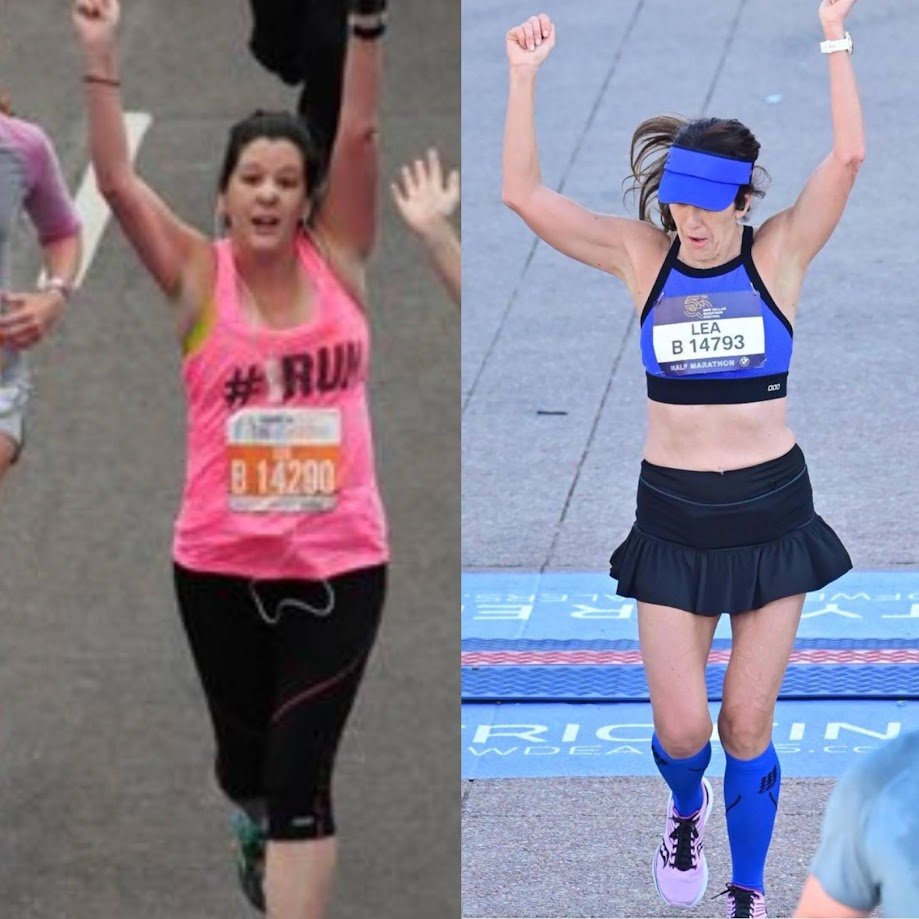Have you ever downloaded a twelve or sixteen-week training plan from the internet, finished all the workouts in the first few weeks, and then got thrown off track? Yeah, me too.
The problem is not that you don't have the dedication, willpower, or personal inner strength to follow through; it is more likely that you didn't (yet) have the skills and habits to fit marathon training into your busy lifestyle. The good news is that you can build those skills now with some work and commitment to new daily actions.
Running is a skill that needs to be cultivated and practiced. You can develop running form, pacing, and mindset skills to help you improve your running performance. But there is more to marathon training than running.
Following a training schedule requires time management skills; how do you fit it all in? Not to mention (oops, I mentioned it) communication skills to keep in touch with your coach.
But not just running and time management. What else makes a good runner? A successful runner likely has other skills, too. To run well, we need to eat well to get enough nutrients and hydration to support our training. You can develop the skills to know what, how much, and when to eat and drink.
What about sleep? We have been doing it since birth, but cultivating good sleep habits and routines can improve when placed under focus. Then there is strength training; you need to know how, what, and when to fit in this other crucial part of your training.
How well do you cope with stress? Do you have recovery practices in place to bounce back from the training? We can develop proficiencies around better stress management. Balancing stress with endurance training is an essential skill.
You see, you can wake up one morning and decide to run a marathon, but there is more to it than following a training schedule. You likely need to develop new skills by repeatedly practicing desired behaviors and then breaking them down into small, specific tasks you can do every day (or almost every day, realistically).
You could jump into a training schedule with a less-than-desirable form and pacing strategy (or worse, no strategy). If you don't have good sleep and nutrition habits and aren't focusing on strength or mobility training, you may have significant gaps in your training that will cause issues, burnout, over-training, or injury down the line. Maybe not today or tomorrow, but when you ask your body to perform at high levels, such as when you train for a marathon, you must give it what it needs to perform well, or it will eventually break down.
This information is not to scare you or overwhelm you. Quite the opposite, my friend! I want you to focus on one or two skills or practices for a few weeks each to get the most out of your marathon training. The good news isn't that you don't have to develop all these new skills at once (that would be a difficult task, even for the most dedicated, free-scheduled athlete). You break them down and build on them through your marathon training plan—one step at a time.
How to Develop the Skills to Run a Marathon
Before we start, think through the skills you have already developed, which come naturally through experience and repeated behaviors. From your life circumstances, you may already have strong mindset skills and know how to view challenges as growth opportunities. From your career experience, you have exceptional communication and time management skills that you can apply to your training.
But then, maybe nutrition feels confusing and overwhelming, as it does for many people. Stress might be high; after all, you have a demanding job and more demanding kids and still try to maintain some semblance of a social circle outside of toddler birthday parties. And sleep? You last did that in college.
Thinking through this is a positive. It gives you an idea of where to start because, as I mentioned, you shouldn't try to change everything at once. Notice the bright spots in current skill levels and see where you may need to fill the gaps.
Of course, given the goal of a marathon, running takes top priority. If you want to run a marathon, consistently getting in the miles is where you need to start. No matter how well you are fueled, rested, and mentally ready, you will only reach your goals with the proper running training.
What behaviors do you want to perform consistently to achieve your goal? I broke these down into two-week segments so that it would feel manageable. You, of course, can change the order, revise the practices or actions to meet your needs or skip anything you feel comfortable with already or aren’t ready to tackle.
I highlighted some important skills needed for marathon training: Time management, moving often, moving well, eating enough nutrients, getting enough sleep, having a growth mindset, and tolerating stress.
For every two weeks, choose one practice to work on and only one or two daily actions. More is not better! The idea is to keep it manageable, so if you struggle to complete the daily action consistently, break it down into something smaller. If you need more time on a particular practice, extend it! The goal is that with repeated daily actions, these will become habits that don't take a lot of brain power or motivation; they will become second nature.
No action is too small. It is better to take tiny steps and achieve them easily and consistently than to take on big actions you can’t complete. You can always build on small activities; don’t underestimate the power of tiny steps forward.
SKILL: PLAN, PRIORITIZE AND PREPARE (TIME MANAGEMENT)
Weeks one and two:
Practice: Make time and plan ahead
Action: Spend five minutes every Sunday reviewing your upcoming training plan and identifying any obstacles and your plan for working through them.
Daily action: Add your workouts to your daily calendar and plan time to complete them. Track if workouts were completed.
SKILL: MOVE OFTEN
Weeks two and three:
Practice: Establish bare minimums, whether several days per week or the fewest minutes per session, and commit to hitting them. Note you can always do more than the bare minimums, but set up the minimums as a catch-all so you don't end up having grand plans but doing nothing.
Daily Action: Journal your workouts, keep a calendar of planned and executed workouts, noting if you hit your bare minimum.
Daily Action: Develop an if/then plan by thinking through any challenges that might come up in regard to your training schedule and what adjustments you will make to work through them.
SKILL MOVE WELL
Weeks three and four:
Practice: Focus on Form
Daily action: Think through and practice two to three running form tips while on your run.
Daily action: perform strides at the end of your run
Practice: Pacing
Daily action: Pay attention to your breathing, talk tolerance, or heart rate at different paces. Journal these discoveries
Practice: Strength training
Daily action: Do one strength exercise every day, slowly and mindfully
Daily action: Journal your strength activities, reps, sets, weights, and how you feel during and after
SKILL: EAT ENOUGH NUTRIENTS
Weeks five and six
Practice: Eat enough protein
(choose one or two at a time)
Daily action: add a plam of protein to each meal and snack
Daily action: add a post-workout protein recovery shake
Daily action: Track your total daily protein intake
Practice: Stay Hydrated
(choose one or two at a time)
Daily action: Track your water intake throughout the day
Daily action: Drink a cup of water upon waking, two cups with each meal, one cup with each snack, and one cup after dinner.
Daily action: use a refillable water bottle and challenge yourself to fill up a certain number of times a day
Practice: Track Nutrition Intake
(choose one or two at a time)
Daily action: Keep a food journal (on paper or online or photos)
Daily action: Track portions or macronutrient intake (carbs, proteins, fats)
Daily action: review food journal against daily needs at the end of each night
SKILL: GET ENOUGH SLEEP
Weeks seven and eight
Practice: Prioritize sleep
Daily action: set and reinforce sleep boundaries and bedtimes
Daily action: incrementally increase sleep time each week until desired about reached
Practice: Create a pre-sleep ritual
Daily action: Turn off electronics 1 hour before bed
Daily action: Read a relaxing book
SKILL: GROWTH MINDSET
Weeks nine and ten
Practice: Focus on effort over results
Daily action: keep a training log and track your effort and how you feel
Daily action: Place a sticky note somewhere you see it often: "Progress, not perfection."
Practice: Identify bright spots
Daily action: Write down a daily win in regards to your training
Daily action: Keep a strengths log and read it daily
SKILL: TOLERATE STRESS
Weeks eleven and twelve
Practice: Actively destress / active recovery
(choose one or two at a time)
Daily action: walk with family, friends, or pets
Daily action: read for pleasure
Daily action: create and listen to relaxing music
Daily action: meditate for five minutes
As you can see, there are many skills involved in successful marathon training, and this is not an exhaustive list. It takes time, persistence, and patience, so give yourself some grace to grow and learn, physically and mentally, during this process.
There are lots of options here, but they are not intended to be tried all at once (unless you enjoy failing spectacularly)! What skill will make the biggest difference in your training or will be the easiest to master? Start there.
I said it once before, but it bears repeating now. Choose one practice and one or two daily actions to focus on at one time. Any more, and you’ll likely get overwhelmed and end up doing nothing. Does it seem too easy? But are you doing it now? If the answer is no, it’s a great place to start!
The next step is up to you! What practices can you develop to get the most out of your training? What consistent behaviors can you practice to improve your chances of a successful marathon? What daily actions make the most sense with your lifestyle? Choose something that you feel confident you can complete every day.
It's an experiment. Try something out. How did it work for you? Adjust as necessary. Of course, working with a coach can help streamline these decisions. A coach can help you guide you towards the best next steps and help you when obstacles arise. Training for a marathon is more than following a training plan; it's developing the skills needed to ensure the best possible outcome.
I'd love to help.
Did you like this post? Do you know someone who might benefit? It helps me when you share with your friends and followers.
Questions? I’d love to help.




















